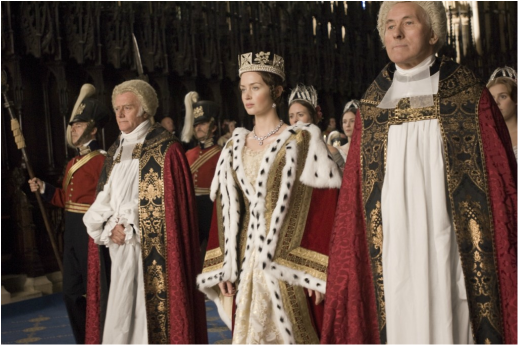|
Begins with the sound of 19th century British royal guard calling out the Royal Salute while in formation. The long line of men in red jackets and tall black hats buckled in gold under the chin; all carrying guns evokes a sense of authority, power, protection and mystery, all in one as the scene fades to a blur and then clears again to a young Queen Victoria, in a red thick velvet cape with black and white fur-like trimming, who is with her beloved King Charles Spaniel, and her lady in waiting. Emily Blunt begins the voice over, "Some people are born more fortunate than others," and so ensues a look into the life and lifestyle of the eventually to be Queen Victoria, who was ruled as a young child by the Kensington System, whereby she was disallowed to do anything on her own and even had to walk down the stairs while holding the hand of an adult at all times. She tells that every little girl wants to be her own princess, even the princess herself.
This system of rules, created and run in junction by Victoria's mother and her lover by insinuation, Sir John Conroy, seems to cover a two fold purpose: one that since Victoria is the only child with claim to the English throne, she has to be duly protected in all possible ways and therefore lives without peer. The second reason being that disallowing the future Queen any sense of autonomy will break her down into signing a regency agreement giving her German born mother control with Sir John controlling her mother. There is a fluid variation in time sequence and it is now June 28, 1838. Queen Victoria is coronated as her feet cannot touch the ground, (her real life height was slightly under five foot tall). The time goes back to when Victoria is an ill teenager, refusing to bow to Sir John's pressure that she sign the regency order. The glow of a fire gives a warm orange-yellow illumination upon the ill girl, as she lies in bed, and her seeming captors. Sir John responds to Victoria's refusals to sign the order with violence, by taking the pen and forcing it into her hand. "I say you will," says he. The pen is thrown on the ground by her. "I say I won't," says she. This scene is thankfully interrupted by Victoria's lady in waiting who has come to give the princess her medicine. At King Leopold's (who is the brother of Victoria's mother) palace in Belgium the politics of Victoria's stance are discussed between Leopold I and an advisor. It is Leopold who insists quite strongly of the marriage of Victoria to her first cousin, Albert of Germany. He is uncle to both of them. Victoria continues to hold the hand of her lady in waiting as she walks down the stairs, skipping the last couple with childlike spirit. Meanwhile Albert is drilled by his advisor as to what novels the princess likes, what she is and is not allowed to do, as well as the types of her various recreations. It is strongly in Leopold's interest for Albert to marry Victoria, as this would solidify alliances among Europe's nobility to his favor. The film talks about Leopold's "survival" being based on having increased access to British resources, yet none of the characters in the film act as if they have survived a day in their lives, though they all have their own battles and sorrows. Albert and his brother visit Victoria where she is staying in a palace belonging to the King of England. Albert attempts a sales pitch upon initially meeting the princess by claiming to have read Sir Walter Scott. The visit awkwardly continues as Albert, with his brother and Victoria, with her surrounders; play chess while they are gazed at to see if their relationship is developing. It does, as the turning point is when Victoria asks Albert, "Do you ever feel like a chess piece yourself in a game being played against your will?" He does not say he does but asks her if that is how she feels. She replies, "Constantly," and that, "I see them leaning in and moving me around the board." "The Duchess and Sir John?" he inquires, coldly referring to her mother as the former. "Not just them," she says, referring to King Leopold and others. Albert tells her, "Then you had better master the rules of the game until you can play it better than they can." She asks him, "You don't recommend I find a husband to play it for me?" "I should find one to play it with you, not for you." Their friendship progresses and continues after the King has died and the new Queen is on the throne. The film implies Victoria is more spirit than strategy at times in ruling her Kingdom and that some members of parliament did not react well to a little woman on the throne with female advisors which lead to general confusion as to outsourcing decisions in order to help the populace of England at large. By accounts the Queen proposed to Albert and their marriage despite ups and downs and squabbles related to the authority as well as the ruling of the Kingdom, was a uniquely happy one. When Albert died at the age of 42, from illness, Victoria spent the rest of her life in mourning. They had nine children together whose descendants live throughout the world. By Sarah Bahl Comments are closed.
|
Archives
June 2017
Categories
All
|

 RSS Feed
RSS Feed